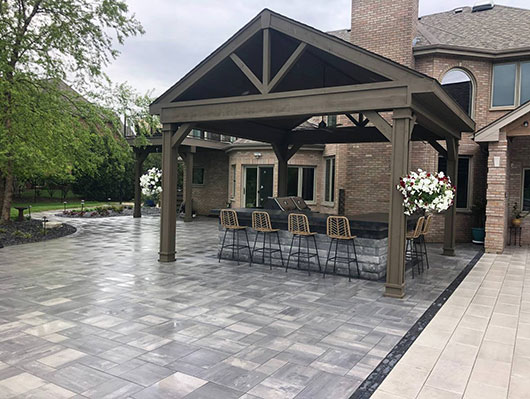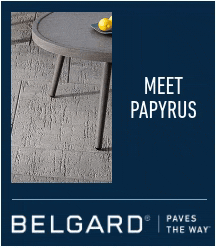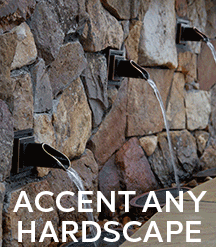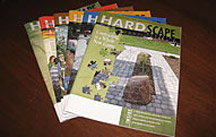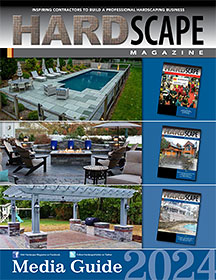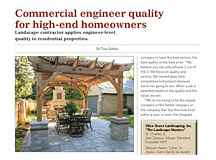Contractor Stories
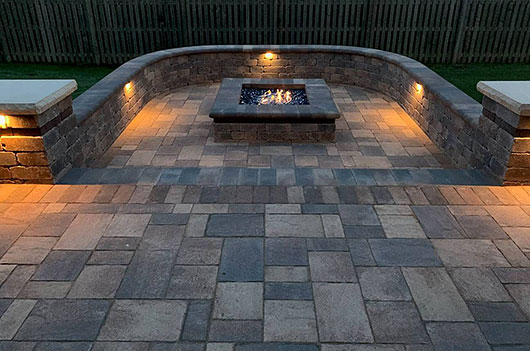
Productivity & profitability in a people business
By Tom HatlenBob Tunzi likes where his business is. He has 10 field employees, a full-time office manager and himself. So, no middle management. While he no longer works in the field, Bob does all the selling and project managing, and nearly all of the design work.
“It keeps me busy. But that’s okay because that way you always have your hand on the pulse of what’s going on with your company. We’ve always been a tight, lean machine. It’s all about profitability.”
Profile
Tunzi & Sons Landscaping, Inc.
Peotone, ILEstablished 1987, full time 1993
Owner Bob Tunzi
Customer base
80% residential20% commercial
Services
48% hardscape32% landscape
20% maintenance
Project price range
$7,500 to $200,000Employees
10 field employees1 office manager
“Prosult taught me a lot about structuring my company for profitability. The best thing about it was there was a lot of accountability. We'd have an annual meeting in Richmond and we shared our numbers. We would benchmark our numbers to see how we stood versus other companies, and where we maybe should be.”
“I learned how to price work the right way. And so we've been able to maintain good profit margins over the years.”
Crew size – a big part of productivity
Another thing they stress at Prosult is crew productivity. Bob says a big part of that is crew size. He usually runs 2-man crews.“When I first started I had 4 guys on a crew and I was one of them. Sometimes I'd have 5. But over the years I've found, 2 guys is usually the most efficient crew depending on what you're doing. They're a team. Sometimes we'll put a 3rd guy on a crew because we need a driver if we're excavating or moving a lot of material back and forth.
“I still see other companies with a 4- or 5-man crew when I’m out driving, and there's always 1 or 2 of them just standing there. It's never fails.”
Bob runs 4 two-man crews in addition to a fertilization tech and a floater who fills in when a crewmember is out or they need that 3rd person on a crew. 2 crews are dedicated to installation work. He has 1 lawn maintenance crew and 1 hybrid crew. “The hybrid crew does a lot of the detail work. They'll do small mulch jobs or small planting jobs. They also do some maintenance.”
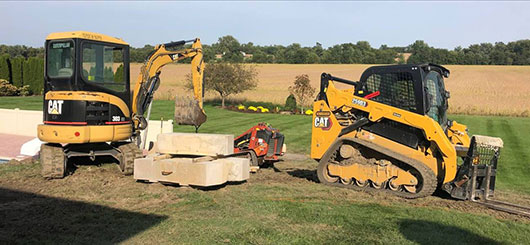
“I have backup equipment for everything. Plate compactors, saws, generators, a track loader, a truck and trailer, everything.” – Bob Tunzi
Equipment – always have a backup
Dysfunctional equipment can also hurt productivity. Bob refuses to let broken down equipment become part of the problem. It’s one of the things he can control. He says, “I'm not an equipment junkie, but I have backup equipment for everything. Plate compactors, saws, generators, a track loader, a truck and trailer, everything.“That way if something breaks down or needs service, you're not thrown into a panic. You don’t have to make that call, ‘Hey, I can't get to your house today because the truck broke down and I can’t bring your material.
“I don't hesitate to buy good equipment. I want our crews to have the tools they need to do the job. A few years ago a guy came to work for me from another company. He said they didn't have enough shovels, so he would get there early to grab a shovel, a $20 or $25 shovel. That’s pretty bad.”
The difference between a good review and a bad one
The equipment has to be there, but Bob says you have to understand that this is a customer-oriented people business. You can do great work but get a bad review if the customer feels like they were left in the dark.Bob says communication has always been an issue for contractors including himself. “Contractors are horrible at it. So we've worked really hard on communicating with customers the past several years, and they really appreciate that.”
Creating a process has been one of the most important things for ensuring communication happens. “I've learned we need to have a process for everything. That way you're not winging it. Every time something comes up, you fall back on the process.”
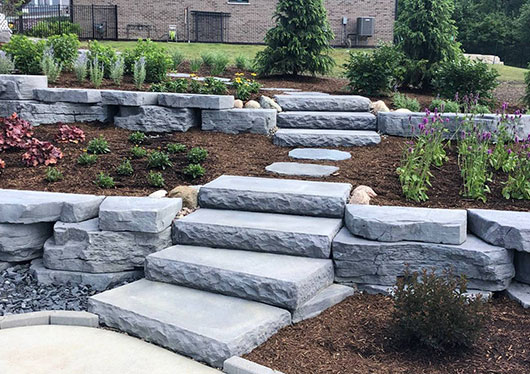
It’s also been critical to have someone who understands the need for communication answering his phone. “I've been lucky. My office manager, Gail, is super at customer service. I get compliments all the time. She had her own childcare business, so she understands what clients want to know: You’ve got to talk to parents, and you’ve got to talk to landscape customers.
“When somebody calls in, she follows the process we developed and fills out the estimate request form. She gathers as much information as possible to find out what they want to do.
“And then she sets an appointment, schedules it on Google calendar and sends them an email. Google calendar is a shared calendar so it works really good for us. We also call the day of the appointment and confirm it. I'm sure it's happened to everyone: You go to somebody's house and they aren't there. The day-of call helps.”
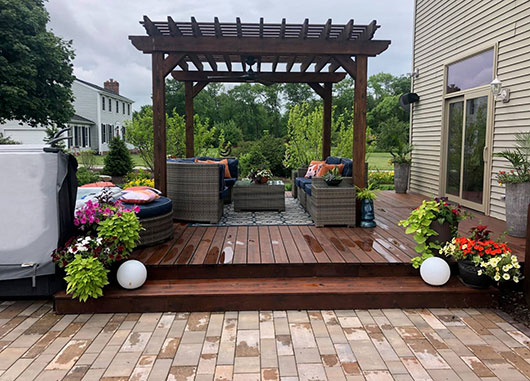
Managing client expectations
With the COVID crush now past, Bob has cut back to where he typically does 2 appointments a day. “This way I’m a little bit more patient. I can spend more time with people and give them my complete attention.”“People think you can come and start working on their project in 2 weeks. So I explain how the process unfolds. ‘Well, we need to design it. We need to price it. We need to fit it into our schedule. We need to get permits. It's a process.’ And, I always leave them with the next step.”
He prefers to set a follow up meeting as the next step, but if the job is simple and straight forward he sometimes just emails a proposal. Either way, he says people don’t like to be left guessing what happens next. Once a contract is signed he gives them an estimated start date and lets them know if they need to do anything in advance.
When it comes to design and choosing materials, Bob learned, “People really lean on their contractor for help, ideas, products, all these different things.” He says that was a point that Unilock consumer research really brought home to him at a seminar last year.
“It's rare that somebody really knows what they want. So part of my job is to help them. ‘Here are some options for what you're asking me to do.’ ‘Here's why I would use this paver versus a different one.’ I will suggest colors because I know how to blend these things, but I don't argue colors with people.”
Changes & problems
Even with everything carefully thought through and agreed upon, Bob says you need to accept that there will be changes, and sometimes problems (real and imagined). “I tell people, ‘God made me a landscaper because he's trying to teach me patience.’ You’ve just got to keep a level head and not allow it to throw the project way out of whack.“Most of the time we’re working with homeowners, and it can be a pretty emotional decision for some of them. It's their home. It's a big investment. And we have to understand that and be responsive when those frantic calls come in.
“I take a lot of pride in what we do and I used to get pretty devastated when someone wasn't happy. It's important to get back to somebody that's irate, but in some cases I try to let it sit for a few hours or even overnight, just so I don't get emotional and give the wrong response.
“Then I’ll go look at the issue, and it's nowhere near what they say. And in most cases we can fix it.”
